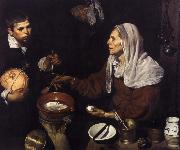Wholesale Oil Painting No Minimum |
|||||||||||
|
|
|||||||||||

|
|||||||||||
|
|
|
||||||||
Velasquez1599-1660,Spanish painter. He was apprenticed to Francisco Herrera the Elder before being trained by Francisco Pacheco. His early works were mostly religious or genre scenes. After arriving in Madrid in 1623, he painted a portrait of Philip IV that won him immediate success and an appointment as court painter. His position gave him access to the royal collections, including works by Titian, who exerted the greatest influence on his style. In his portraits from this period, only the faces and hands of the figures are accentuated, and the dark figures stand out against a light background. A visit to Italy (1629 ?C 31) further developed his style, and on his return to Madrid he entered his most productive period. Velazquez created a new type of informal royal portrait for Philip hunting lodge, and his portraits of court dwarfs display the same discerning eye as those of his royal subjects. On a second visit to Rome (1649 ?C 51) he painted a portrait of Pope Innocent X. The powerful head, brilliant combinations of crimson of the curtain, chair, and cope are painted with fluent technique and almost imperceptible brushstrokes that go far beyond the late manner of Titian and announce the last stage in Velazquez development. This portrait was copied innumerable times and won him immediate and lasting renown in Italy. In his last years he created his masterpiece, Las Meninas (The Maids of Honour, 1656). In this casual scene, the artist is shown painting the king and queen in the presence of the infanta Margarita and her attendants; the nearly life size figures are painted in more or less detail according to their relation to the central figure of the infanta and to the source of light, creating a remarkable illusion of reality never surpassed by Velazquez or any other artist of his age. He is universally acknowledged as one of the giants of Western art. |
||||||||
|
|
||||||||
Omelette woman
Omelette woman Painting ID:: 59500 |
mk267 linen canvas 99 x 128 cm National Museum of London mk267 linen canvas 99 x 128 cm National Museum of London |
|||||||
|
|
||||||||
|
Bartolome Esteban Murillo Spanish 1618-1682 Bartolome Esteban Murillo Galleries Murillo began his art studies under Juan del Castillo in Seville. Murillo became familiar with Flemish painting; the great commercial importance of Seville at the time ensured that he was also subject to influences from other regions. His first works were influenced by Zurbaran, Jusepe de Ribera and Alonso Cano, and he shared their strongly realist approach. As his painting developed, his more important works evolved towards the polished style that suited the bourgeois and aristocratic tastes of the time, demonstrated especially in his Roman Catholic religious works. In 1642, at the age of 26 he moved to Madrid, where he most likely became familiar with the work of Velazquez, and would have seen the work of Venetian and Flemish masters in the royal collections; the rich colors and softly modeled forms of his subsequent work suggest these influences. He returned to Seville in 1645. In that year, he painted thirteen canvases for the monastery of St. Francisco el Grande in Seville which gave his reputation a well-deserved boost. Following the completion of a pair of pictures for the Seville Cathedral, he began to specialise in the themes that brought him his greatest successes, the Virgin and Child, and the Immaculate Conception. After another period in Madrid, from 1658 to 1660, he returned to Seville. Here he was one of the founders of the Academia de Bellas Artes (Academy of Art), sharing its direction, in 1660, with the architect, Francisco Herrera the Younger. This was his period of greatest activity, and he received numerous important commissions, among them the altarpieces for the Augustinian monastery, the paintings for Santa Mar??a la Blanca (completed in 1665), and others. Omelette woman mk284 Oil on canvas 1618 100 x 120 cm National Gallery of Edinburgh |
||||||||
|
|
||||||||
|
Prev Next
|
||||||||
|
|
||||||||
|
Related Paintings to Bartolome Esteban Murillo :. |
||||||||
|
|
||||||||
|
CONTACT US |

